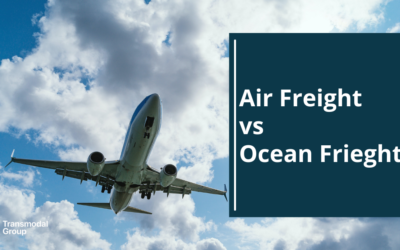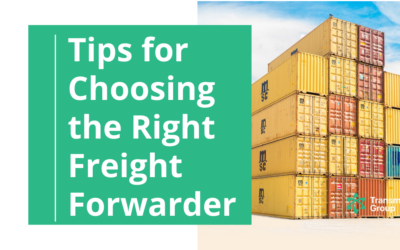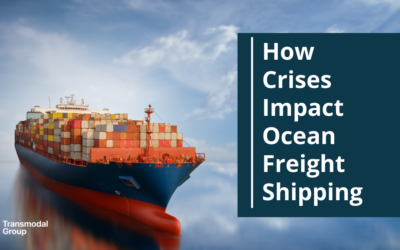Resource Centre
Welcome to Transmodal’s resource centre for freight forms, news, tools, and more!
Latest Blogs
Read our blogs to learn about the latest industry insights, company news, and more.
Happy Holidays & Planning Ahead for 2022
We at Transmodal Group wish all of our clients and long-trusted partners a very Happy Holidays and hope you’re able to enjoy some downtime and unwind while wrapping up the year. We hope that 2022 brings you health and happiness!
Research and Planning: The Key to Successful Customs Clearance Process
International customs clearance involves preparing the shipment for optimal compliance with the applicable regulations so that the goods imported are lawfully sourced and safe for consumers.
Air Freight vs Ocean Freight – What’s Best for You?
A freight forwarding company connects services to streamline the transportation of goods around the world. Because there are so many important processes and moving parts involved, it’s important that businesses choose the best freight forwarder to meet their cargo transportation needs.
Tips for Choosing the Right Freight Forwarder
A freight forwarding company connects services to streamline the transportation of goods around the world. Because there are so many important processes and moving parts involved, it’s important that businesses choose the best freight forwarder to meet their cargo transportation needs.
How Crises Like the Suez Canal Blockage and COVID-19 Impact Ocean Freight Shipping
Ocean freight shipping is an ideal transportation solution for clients with large cargo loads. Under regular circumstances, clients can select the best-suited and most cost-effective steamship options based on specific requirements, including time sensitivity.
Welcome to the New Transmodal Website
We’re excited to announce the launch of our brand-new website! The website features an all-new look with updates designed with our clients’ needs in mind.
Forms
Download important shipping forms to ensure your goods are handled smoothly from reception to final destination.

TIFC Indemnity Letter - FCL

Transmodal POA Import Export

International Routing
Links
Here are some external resources that can be useful when planning and tracking shipments:
Incoterms
Here is a list of commonly used international commercial terms and their definitions.
Cost & Freight (CFR)
“Cost and Freight” means that the seller delivers the goods on board the vessel or procures the goods already so delivered. The risk of loss of or damage to the goods passes when the goods are on board the vessel. the seller must contract for and pay the costs and freight necessary to bring the goods to the named port of destination.
CIF (CIF)
“Cost, Insurance and Freight” means that the seller delivers the goods on board the vessel or procures the goods already so delivered. The risk of loss of or damage to the goods passes when the goods are on board the vessel. The seller must contract for and pay the costs and freight necessary to bring the goods to the named port of destination.
‘The seller also contracts for insurance cover against the buyer’s risk of loss of or damage to the goods during the carriage. The buyer should note that under CIF the seller is required to obtain insurance only on minimum cover. Should the buyer wish to have more insurance protection, it will need either to agree as much expressly with the seller or to make its own extra insurance arrangements.”
Delivered Duty Paid (DDP)
The seller is responsible for delivering the goods to the named destination in the buyer’s country, including all costs involved.
Delivered at Place (DAP)
The seller pays for transport to the specified destination, but the buyer pays the cost of importing the goods. The seller takes responsibility for the goods until they’re ready to be unloaded by the buyer.
Delivered at Terminal (DAT)
The seller pays for transport to a specified terminal at the agreed destination. The buyer is responsible for the cost of importing the goods. The buyer takes responsibility until the goods are unloaded at the terminal.
Ex Works (EXW)
“Ex Works” means that the seller delivers when it places the goods at the disposal of the buyer at the seller’s premises or at another named place (i.e.,works, factory, warehouse, etc.). The seller does not need to load the goods on any collecting vehicle, nor does it need to clear the goods for export, where such clearance is applicable.
Free Arrival Border (DAF)
Charges incurred up to arrival of cargo at stated border payable by consignor. Ensuing charges payable by consignee.
Free Alongside Ship (FAS)
The seller puts the goods alongside the ship at the specified port they’re going to be shipped from. The seller must get the goods ready for export, but the buyer is responsible for the cost and risk involved in loading them.
Free Arrival Depot (CPT or CIP)
CPT – “Carriage Paid To” means that the seller delivers the goods to the carrier or another person nominated by the seller at an agreed place (if any such place is agreed between parties) and that the seller must contract for and pay the costs of carriage necessary to bring the goods to the named place of destination.
CIP – “Carriage and Insurance Paid to” means that the seller delivers the goods to the carrier or another person nominated by the seller at an agreed place (if any such place is agreed between parties) and that the seller must contract for an pay the costs of carriage necessary to bring the goods to the named place of destination.
‘The seller also contracts for insurance cover against the buyer’s risk of loss of or damage to the goods during the carriage. The buyer should note that under CIP the seller is required to obtain insurance only on minimum cover. Should the buyer wish to have more insurance protection, it will need either to agree as much expressly with the seller or to make its own extra insurance arrangements.”
Free Domicile Cleared Including Duty and Taxes (DDP)
All charges to delivered consignee’s site including customs clearance and duties and taxes payable by consignor.
Free on Trailer (FCA)
“Free Carrier” means that the seller delivers the goods to the carrier or another person nominated by the buyer at the seller’s premises or another named place. The parties are well advised to specify as clearly as possible the point within the named place of delivery, as the risk passes to the buyer at that point.
Free on Board (FOB)
“Free On Board” means that the seller delivers the goods on board the vessel nominated by the buyer at the named port of shipment or procures the goods already so delivered. The risk of loss of or damage to the goods passes when the goods are on board the vessel, and the buyer bears all costs from that moment onwards.
Container Specifications

At Transmodal, we offer leasing options for the following containers:
- 20 foot containers
- 40 foot containers
- 40 foot high tube containers
- 45 foot containers
Frequently Asked Questions
What are my options for shipping goods?
At Transmodal, we offer multi modal transportation services, including air and ocean freight.
For large shipments that require careful strategic planning, we recommend our ocean freight services.
For smaller, time sensitive deliveries, we recommend our air freight services.
What type of containers are available?
We have the following standard shipping containers available for lease:
- 20 foot containers
- 40 foot containers
- 40 foot high tube containers
- 45 foot containers
Our containers have the option for temperature control. Clients may also use their own containers if they have them.
Does Transmodal offer door delivery?
What are my options for distribution?
In addition to air and ocean transportation, we also offer logistics for distribution. Click here to learn more.
Who We Serve
Our Customers Look Just Like You
Learn what current Transmodal clients across various industries have to say about our air and ocean freight forwarding services, cross-border trucking, door delivery, distribution, and recurring shipment program.
Reliable.
Experienced.







